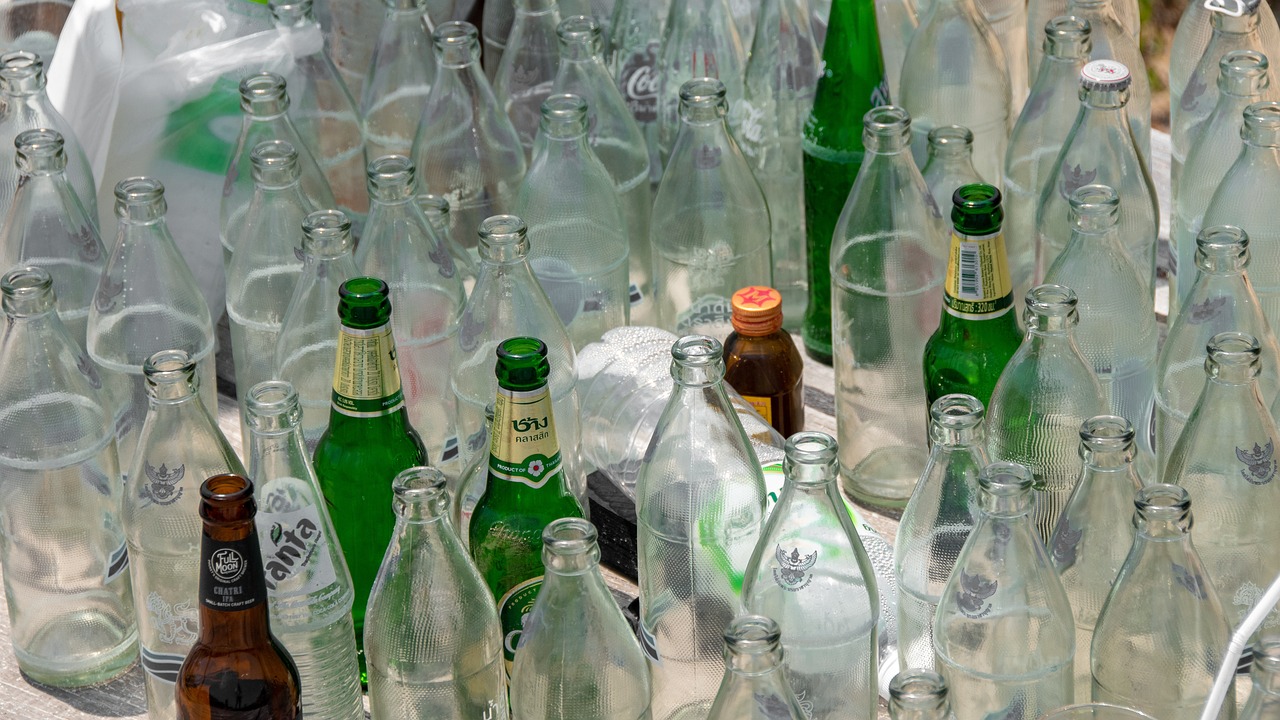Introduction
Picture this. You’re hosting your friends for a dinner party. Your guests admire your unique and stylish kitchen countertop, and when asked about it, you proudly declare it’s made from recycled glass! The oohs and aahs around the room are music to your ears, and you’re just bursting to share more about this eco-friendly trend.
The Rising Trend of Recycled Glass Countertops
The demand for recycled glass countertops has steadily increased in recent years. Part of this is due to the rise in environmental consciousness. The shift toward sustainable living has brought recycled materials to the forefront of home design. With its myriad of color options and inherent eco-friendly properties, recycled glass countertops are becoming the go-to choice for homeowners looking to merge style with sustainability.
The Making of Recycled Glass Countertops
Raw Material Collection
We’ve all heard of recycling, but do we truly understand its importance? Recycling is a vital component of waste reduction. It reduces the need for extracting, refining, and processing raw materials, all creating substantial air and water pollution. Now, just imagine if your kitchen countertop could contribute to this noble cause!
The Recycling Process
It’s fascinating to watch the transformation of waste glass into a stylish countertop. Imagine this: a humble glass bottle, once holding your favorite soda, is now reborn as a part of your gorgeous kitchen. How cool is that?
Manufacturing Process
The manufacturing process involves heat, but don’t worry; it’s not as intense as traditional glass production. Lower heat levels mean less energy consumed, reducing its carbon footprint even further.
Why Choose Recycled Glass Countertops?
Eco-Friendly
Choosing recycled glass isn’t just a fashion statement; it’s a declaration of your commitment to the environment. Using recycled materials saves energy, reduces pollution, decreases greenhouse gas emissions, and conserves natural resources.
Stylish and Unique
Your recycled glass countertop is a piece of modern art, embodying an intricate array of colors and patterns. Remember, you’re not just getting a countertop; you’re getting a unique narrative, a story of transformation and reincarnation.
Durability
Just because it’s made of glass doesn’t mean it’s fragile. Rest assured; it can withstand your culinary experiments and even the occasional “oops” moments in the kitchen!
Recycled Glass Countertops: On a Personal Note
Once upon a time, I had a friend named Sarah. Sarah loved cooking but loathed the lack of personality in her kitchen. I remember her saying, “My kitchen feels like a bland dish, it needs some spice!” So, when she decided to remodel her kitchen, she was determined to add a touch of uniqueness. That’s when she discovered recycled glass countertops.
Fast forward a few months, Sarah’s kitchen was transformed. Her recycled glass countertop, made from her collection of wine bottles, was a work of art. She said, “I love the fact that the wine bottles from our Friday gatherings are now a part of my kitchen. It’s like having a piece of those memories always with me.”
Fascinating Facts
In terms of data, did you know that around 80% of recovered glass is used to make new glass products? However, we still send millions of tons of glass to landfills every year. The use of recycled glass countertops can significantly contribute to reducing this waste.
According to a report from the Environmental Protection Agency, using recycled glass provides a 33% energy saving over producing new glass, and each ton of recycled glass saves one ton of natural resources. So, opting for recycled glass countertops is a great way to contribute to energy and resource conservation.
Comparing Recycled Glass Countertops with Other Options
Laminate Countertops
Once the darling of budget-conscious kitchen remodels, laminate countertops have their benefits. They’re affordable, lightweight, and available in various colors and designs. However, they’re not exactly on par with recycled glass regarding durability and eco-friendliness.
Consider this: you accidentally drop a heavy pot on your laminate countertop. You’re likely to end up with a nasty dent or, worse, a chip. But with a recycled glass countertop? It would just laugh it off!
And let’s talk about style. Laminate attempts to mimic the look of natural stone or wood, but it’s like comparing a photo of a beautiful beach to being at the beach. It’s just not the same. With its unique charm and natural beauty, recycled glass clearly wins the style contest.
Granite Countertops
Granite, the grand old man of countertop materials, has been a favorite in kitchens for a long time due to its durability and classic elegance. However, let’s put our detective hats on and examine granite a bit more closely.
Imagine you have a hot pan fresh off the stove. You place it on a granite countertop without thinking twice. While granite can handle the heat, over time, regular exposure to high temperatures can lead to discoloration and weakening of the surface. Now, imagine doing the same thing with a recycled glass countertop. With its high heat resistance, it takes the heat like a champ without breaking a sweat.
And then there’s the matter of style. Granite is available in various patterns but has the same underlying tone and texture. They’re like a choir singing in unison – pleasing but monotonous. On the other hand, recycled glass countertops are like a jazz band – colorful, energetic, and full of life.
Quartz Countertops
Now let’s talk about quartz. Quartz countertops are engineered stone products, which means they’re about 90% quartz and 10% resin. This combination makes them incredibly durable. However, durability alone isn’t the endgame, is it?
While quartz countertops are scratch and stain-resistant, they don’t fare well against heat. Place a hot pot directly onto a quartz countertop and you might end up with a ghastly burn mark. Ouch!
From a style perspective, quartz offers a multitude of colors. However, the uniformity of the patterns can be a turn-off for some. It’s like watching reruns of your favorite TV show – it’s comforting, but there are no surprises. With recycled glass countertops, the variety is limitless. Each piece is unique, telling its own tale of transformation.
Moreover, the eco-friendly aspect of recycled glass far surpasses quartz. The resin used in quartz countertops is a form of plastic, and the process of making these countertops is energy-intensive. On the flip side, recycled glass countertops use existing materials, significantly reducing their environmental impact.
Concrete Countertops
Concrete countertops, beloved for their industrial look and customizable nature, have gained popularity in recent years. But they do have their downsides.
Concrete is porous and needs regular sealing to prevent staining – a maintenance hassle. And while they can be tinted or textured, they lack recycled glass’s innate, whimsical beauty. Imagine comparing a blank canvas (concrete) to a masterfully created mosaic (recycled glass) – the latter offers an intricate beauty that’s hard to replicate.
Moreover, concrete’s environmental footprint is quite heavy. The process of making cement (the key ingredient in concrete) is energy-intensive and emits a high level of CO2. On the other hand, recycled glass stands as a champion of sustainability, diverting waste from landfills and reducing energy consumption.
Marble Countertops
Marble, the epitome of luxury, is often the dream countertop material for many homeowners. But owning a marble countertop is like owning a high-maintenance pet – it requires a lot of care and attention!
Marble is susceptible to staining and scratching. A single spill of red wine can send you into a cleaning frenzy. But a recycled glass countertop would just ask you to pour another glass and relax!
When it comes to uniqueness, marble slabs do vary, but they still follow a general theme. Recycled glass, however, is a chameleon, changing its appearance based on the type of glass used, giving you a countertop that’s as unique as you are.
Furthermore, marble needs to be quarried, which can cause significant environmental damage. In contrast, recycled glass countertops use waste materials, helping to reduce environmental harm.
Cost and Maintenance of Recycled Glass Countertops
Initial Investment
Every dollar you invest in a recycled glass countertop is a dollar invested in our planet. Sure, it might cost a bit more upfront, but the long-term benefits, both for your home and the environment, make it a worthy investment.
Ongoing Maintenance
Regarding maintenance, recycled glass countertops are as chill as a cucumber in a tub of cool whip. They don’t demand much – just some regular cleaning, and they’ll stay stunning for years.
How to Select the Right Recycled Glass Countertop
Choosing the right recycled glass countertop is like choosing the right pet – you should consider its personality, maintenance, and how well it fits into your lifestyle.
- Consider Your Kitchen Theme: Start by considering the overall theme of your kitchen. Are you going for a modern and minimalist look? Or do you prefer a traditional and rustic vibe? The beauty of recycled glass countertops is their versatility. They can complement virtually any kitchen style.
- Decide on Colors and Patterns: Next, decide on the colors and patterns. Recycled glass countertops come in a range of hues, from cool blues to vibrant reds and earthy greens. The trick is to pick a countertop that complements your kitchen color scheme and enhances the overall aesthetic.
- Think about Maintenance: If you’re someone who values low-maintenance materials, you’ll love recycled glass. However, make sure to inquire about the exact maintenance requirements of the specific countertop you choose. Some might require special care or products.
- Mind Your Budget: Finally, consider your budget. While recycled glass countertops are more expensive than some traditional materials, remember that you’re paying for durability, uniqueness, and the added benefit of an eco-friendly choice.
- Having ventured deep into the world of recycled glass countertops, we can now appreciate the profound significance they hold not just as a piece of decoration, but as a statement of our commitment to sustainability. Beyond the beautiful colors and unique designs, lies a narrative of transformation – of discarded glass bottles morphing into something spectacular and purposeful.
Final Thoughts
Choosing recycled glass countertops is akin to giving glass a second life, a chance to shine in a new form. So next time you’re sipping a glass of wine, think about this: could this wine bottle be a part of your future kitchen?
And remember Sarah? She’s now a recycled glass countertop convert, regularly advocating for them in her social circle. Her kitchen, with its stunning recycled glass countertop, has become the heart of her gatherings.
So, as you mull over your kitchen renovation options, think about what you want your kitchen to represent. If a combination of style, sustainability, and a dash of whimsy appeals to you, recycled glass countertops might be your answer.
FAQs
As we wrap up, you might still have a few questions lingering in your mind. Here are the answers to some commonly asked ones:
How durable are recycled glass countertops? They’re incredibly durable! They’re heat, stain, and scratch-resistant, making them a great choice for busy kitchens.
Are recycled glass countertops expensive? While they might be more expensive than some traditional materials, remember you’re investing in a unique, durable, and eco-friendly countertop that’s bound to be a conversation starter.
Can I customize the look of my recycled glass countertop? Absolutely! One of the greatest advantages of these countertops is their versatility. You can choose from various colors and glass types to create a countertop that matches your style.
How do I maintain my recycled glass countertop? It’s pretty straightforward. Regular cleaning with a non-abrasive cleaner will keep your countertop sparkling. Just avoid using harsh chemicals to prevent damaging the surface.
Is it hard to install a recycled glass countertop? It’s best to hire a professional for the installation to ensure it’s done correctly. But once it’s installed, you can sit back and enjoy your stunning and eco-friendly countertop.





Pingback: Facts About Recycling: Conserving Resources & Building Sustainability
Pingback: Eco Friendly Laundry Detergent: Why and How to Make the Switch
Pingback: Navigating the World of Sustainable Clothing Brands
Pingback: Sustainable Fish: Safeguarding Our Oceans' Future - Eco Life Wise
Pingback: Eco Friendly Toilet Paper: A Cheeky Guide to Going Green
Pingback: Eco Friendly Phone Cases: Smart For a Sustainable Lifestyle
Pingback: Why is Recycling Important? A Definitive Guide - Eco Life Wise
Pingback: Sustainable Jewelry: The Future of Ethical Fashion - Eco Life Wise
Pingback: Sustainable Gifts: An Eco-Friendly Choice - Eco Life Wise
Pingback: Benefits of Recycling: Maximizing Your Impact for a Greener Planet
Pingback: Recycling for Kids: A Journey Towards a Sustainable Future
Pingback: Sustainable Shoe Brands: A Step Towards a Greener Future
Pingback: Goodwill Recycling: Transforming Lives and Our Planet
Pingback: Eco Friendly Companies: Meet the Eco Super Heroes
Pingback: Eco Friendly Gifts: A Sustainable Guide - Eco Life Wise
Pingback: Bokashi Composting: Green Thumbs, Unite!
Pingback: 15 Facts About Recycling You Probably Didn't Know
Pingback: Recycled Shoes: A Step Towards a Sustainable Future
Pingback: How Do Solar Panels Work: A Guide for Curious Minds
Pingback: Is Cardboard Recyclable? You Might Be Surprised | Eco Life Wise
Pingback: Composting Worms: The Unsung Heroes of Your Garden *
Pingback: Benefits of Organic Apple Cider Vinegar: An Indepth Guide
Pingback: What Is The Difference Between Upcycling And Recycling? 5 Unique Differences | Eco Life Wise
Pingback: How Can I Make My Bathroom Eco-friendly? | Eco Life Wise
Pingback: How Does Upcycling Reduce Waste And Consumption? 10 Innovative Ways | Eco Life Wise
Pingback: Salangae Solar Garden Lights Review: 10 New Facts | Eco Life Wise
Pingback: Vegan Shoes: 10 Little Known Facts to Get You Excited | Eco Life Wise
Pingback: Rubbermaid Swing Top Recycling Container Review: 10 Handy Options | Eco Life Wise